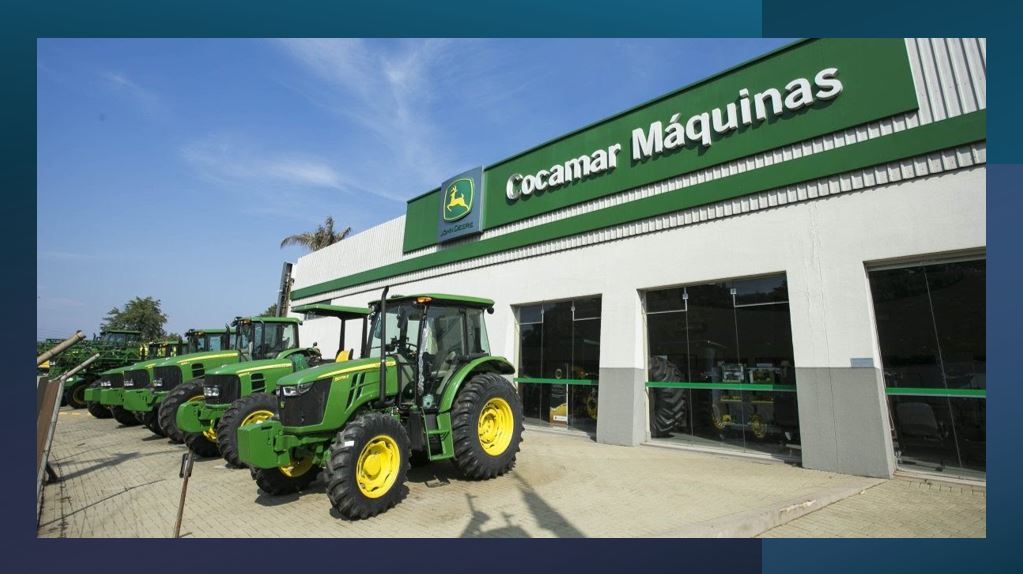With data collectors and RFID printers, John Deere dealership reduces the time needed to list 130,000 items at 11 service points in the north and northwest of Paraná by at least 50%
Cocamar Máquinas, which has been a John Deere dealership for seven years, a world leader in the manufacture of agricultural equipment, delivers the entire ecosystem of products and solutions for the field with a focus on the north and northwest of the State of Paraná. With an eye on optimizing operational efficiency and expanding its competitive advantages, the company from Paraná implemented the Lean Six Sigma project in 2023. The objective was to adopt new technologies in inventory activities and automate the inventory process.
This change was necessary to improve the traceability of spare parts, previously carried out manually through handwritten notes made by employees. A practice that did not avoid the presence of a large margin of error, in addition to impairing the accuracy of the information extracted from the inventory.

To take the work of listing all 28 thousand product items (SKUs) and 130 thousand total units stored in its 11 service points (covering the municipalities of Maringá, Paranavaí, São Pedro do Ivaí, Querência do Norte, São Jorge do Ivaí, Cornélio Procópio, Apucarana, Ivaiporã, Cambé, Andirá and Santo Antônio da Platina), Cocamar Máquinas counted on Seal Sistemas, one of the largest integrators of advanced technologies for the supply chain in Brazil, to develop a broad automation.
The partnership has already resulted in the adoption of data collectors and barcode printers to improve process efficiency and the assertiveness of the information available to customers about each component. Both devices are compatible with RFID technology (radio frequency identification), which the dealership intends to use in the near future to adopt active inventory – or the constant and real-time accounting of items in stock, with the support of tags and antennas radio frequency.
Inventory agility
Even before reaching this advanced stage of automation, Cocamar Máquinas management has already managed to reduce the frequency and duration of inventories, in addition to increasing the level of reliability of this activity. With the support of automation and without the use of paper, stock counts, which used to be a time-consuming activity, became a task carried out weekly and no more than every six months and brought continuous monitoring of the accuracy of information. Furthermore, the time required to complete the inventory fell from three days to up to 24 hours in a medium-sized branch; and from five days to up to two and a half days in a large unit.
Today equipped with collectors and printers, employees now receive notification of the task to be performed as soon as the item enters stock. Then, they just need to beep the barcodes to automatically register each product in the system. Through a lock system, the technology also helps employees follow the correct procedure by preventing any receiving or shipping steps from being missed. This way, all components are properly checked, something that was not possible using paper.
“The time we spent without automation was drastically reduced after implementing data collectors. In addition to greater agility in inventory and greater data visibility for stockists, we eliminate the margin of error by ensuring the correct location of each item within the stock”, says Alison Cesar de Souza Borges, corporate supervisor of parts at the front of stock at Cocamar Máquinas.
Machine traceability
The next phases of Cocamar Máquinas' automation project will begin in the first quarter of 2024. The next stage involves the adoption of new RFID readers and Kairos IoT, a WMS software developed by Seal Sistemas that will operate in an integrated manner with the collectors of data and printers – which already have the functionality to print radio frequency labels.
In the future, with the adoption of active inventory as a pilot project, Cocamar Máquinas expects that shipping points will be controlled remotely and in real time with the support of RFID technology. To this end, the company intends to carry out tests with an ATR7000 antenna, to be installed on the roof of the warehouse.
The objective is to extend the traceability infrastructure beyond spare parts, including the stock of agricultural machinery sold in its units – such as tractors, harvesters and sprayers.
The positive repercussions surrounding the automation of Cocamar Máquinas' inventory gave impetus to other automation projects in dealerships located in the north and northwest of Paraná. Digitization in other players in the region went beyond inventory and covered other operational stages, such as work order, warehouse and shipping.
Agricultural mobility
“The digital transformation of inventory management is a trend capable of benefiting several segments involved in the distribution chain. The project we developed for Cocamar Máquinas is yet another example of the high applicability of technologies such as data collectors and RFID to automate stocks and accelerate the inventory process, increasing operational efficiency even in the agricultural inputs sector”, says Wagner Bernardes, CEO of Seal Sistemas.
The implementation at Cocamar Máquinas was one of the winners of the 2023 Highlight Innovation Award, a traditional Seal Sistemas event that annually celebrates the projects and initiatives that most stimulated efficiency and innovation through technology. The dealership was awarded in the “Agricultural Mobility” category.
“Today, technology is capable of optimizing the traceability of any item, from small components to large machines and products. Whether in retail, logistics, the agricultural sector or many others, we work to integrate the most advanced solutions on the global market into a complete range of services, expanding Brazilian players' access to the most advanced digitalization of the supply chain. ”, says Ruy Castro, vice president of regional sales at Seal Sistemas.












